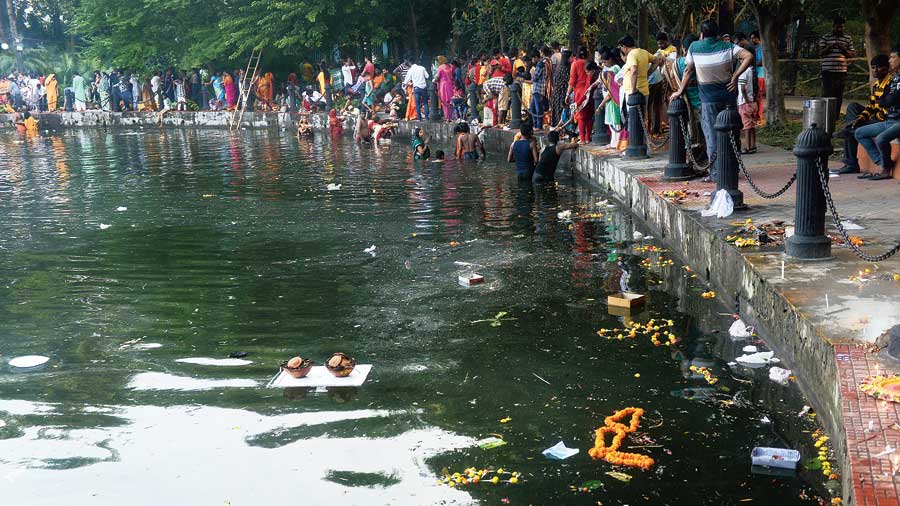The National Green Tribunal on Thursday refused to hear the Calcutta Metropolitan Development Authority’s prayer to allow Chhath rituals on the Rabindra Sarobar premises and told the Bengal government’s lawyers they should feel happy that no cost had been imposed on them for filing such a petition.
Tens of thousands of Calcuttans welcomed the order. One of them, Sumita Banerjee, told The Telegraph: “The CMDA is the protector of the place. Now imagine what sort of a protector is it that is asking for a relaxation that would destroy and devastate the place?”
The tribunal’s eastern zonal bench of Justice S.P. Wangdi and expert member Nagin Nanda dismissed the review petition filed by the CMDA requesting modification of a 2017 order of the bench that had imposed a ban on Chhath Puja on the Sarobar premises.
“We are dismissing the petition,” the bench said once the case came up for hearing. “You should feel happy that we are not imposing the cost.”
But the state has not given up. An official said it was likely to move the Supreme Court against the tribunal’s order.
Many thought the state’s position was dictated by the electoral necessity to not annoy Chhath worshippers ahead of the Assembly elections next year.
There are many on the other camp, too, who value the biodiversity that the spraw-ling south Calcutta lake and the greens surrounding it represent.
Author and singer Amit Chaudhuri, who has often fought an unequal battle with the city’s agencies to protect its heritage, told The Telegraph the CMDA’s petition was “in keeping with the tradition of government organs in Calcutta” not doing what they are meant to do. “This is not an aberration,” he said.
Last year, thousands of Chhath revellers had broken padlocks on the gate and entered the lake premises, burst firecrackers, lit diyas on the water, played loud music and dirtied the place as police virtually allowed them a free run.
The CMDA, in its submission, accepted its inability to comply with the tribunal’s order in 2019 stating that “the worshippers forcibly entered the Sarobar breaking the locks and Chhath Puja was forcefully performed in Rabindra Sarobar”.
“We were helpless. The police did not help us (stop the revellers),” said a CMDA official.
The ban was based on recommendations of an expert committee set up by the tribunal to assess the environmental status of the waterbody. Environment activist Subhas Datta, whose petition had originally prompted the tribunal to impose the ban on Chhath Puja at Rabindra Sarobar, said after the dismissal of the petition: “We should not stop at this. We have all seen how the ban was flouted last year. We will have to ensure it is implemented this time.”
The Telegraph had on September 8 reported that the CMDA, the custodian of Rabindra Sarobar, had filed a review petition at the tribunal seeking a “special permission” to allow Chhath Puja at the Sarobar.
A CMDA official said their petition was a “suo motu” action. The official added that the agency filed the petition because the matter involved “the emotion of lakhs of people and the CMDA was not in a position to stop a mob” from entering the premises.
The local Trinamul councillor, Baiswanar Chatterjee, echoed: “I am not ready to accept the version of environmentalists as gospel. One also has to acknowledge religious sentiments and the fact that the ritual is being practised for a long time.”
Residents of the area disputed Chatterjee’s claim. They said the scale on which the defiling happens started around 2010.
Datta said the administration had also failed to implement most of the recommendations proposed by the expert committee, even though they had been turned into a judicial order.
Arunabha Majumder, an emeritus professor of Jadavpur University, said an event like Chhath at the lake contributes to water pollution in various ways. “First, the BOD (Biological Oxygen Demand) increases with the increase of organic matter in water with so many people bathing, and fruits and flo-wers being dumped there. Secondly, oil and grease poured into the water as part of puja offerings reduce oxygen transfer in the water, which may affect the lives of aquatic animals.”
State urban development minister and CMDA chairperson Firhad Hakim had earlier promised to clear the pollution within a day, which has been countered by the green crusaders. “Cleaning the banks and reducing the pollution are not the same, as the latter has a far reaching impact on the environment,” an activist said.
Save the lakes
The CMDA should not have filed the review petition. Rabindra Sarobar is like the lungs of south Calcutta. It holds such an important place in terms of the city’s environment. If a precedent is set by allowing Chhath Puja at Rabindra Sarobar, then many more things would have been done using this precedent.
Abin Chaudhuri, architect and Lake morning walker
There is a tradition of bodies that are meant to protect not doing their job in Calcutta. This is not an aberration, but it should be countered and opposed. People should continue to oppose as long as bodies and government organs that have been entrusted with a certain duty do not do that. As long as they do not realise that it is their job to be responsible for something, we should continue to oppose it.
Amit Chaudhuri, author, singer and founder of Calcutta Architectural Legacies (CAL)
The CMDA is the protector of the place. Now imagine what sort of a protector is it that is asking for a relaxation that would destroy and devastate the place. The NGT has said that Chhath Puja cannot be organised inside the Sarobar. It is the government’s duty to see that people go to other places. The government is meant to make people obey a court’s order.
Sumita Banerjee, a regular at Rabindra Sarobar and an activist fighting for its protection











